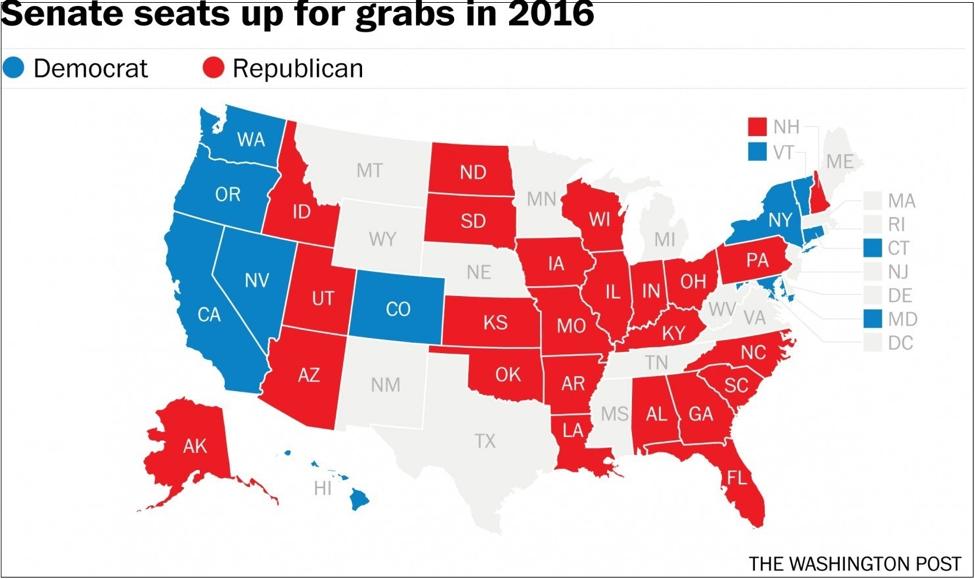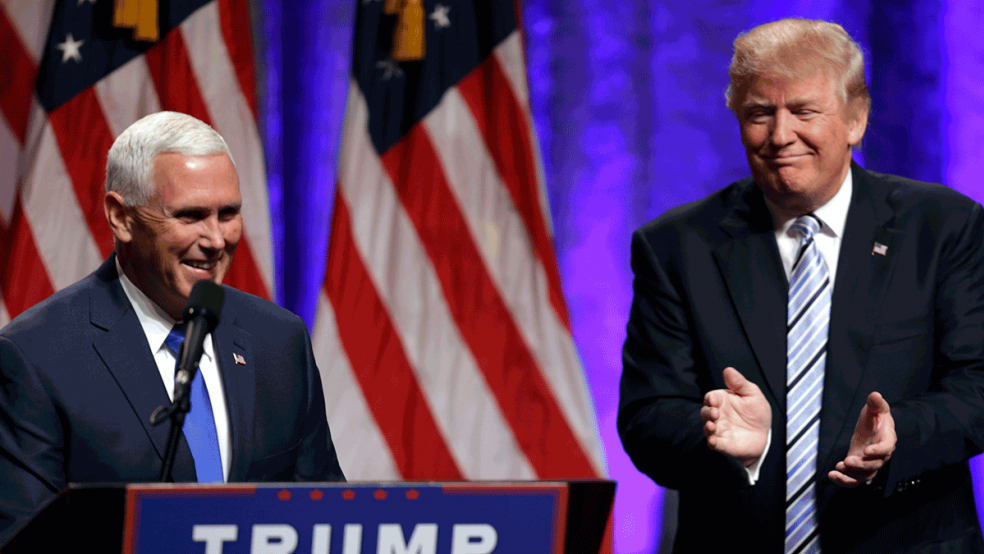For a while, it looked as if presumptive Republican nominee Donald Trump and his fiery style might pose a serious drag on the rest of the Republican ticket, especially in the GOP’s desperate effort to retain control of the Senate.
Endangered GOP incumbents sought to distance themselves from Trump, uneasy with his controversial attacks on Muslims and immigrants and his vow to shake up Washington. Many of them have found excuses to stay away from the Republican National Convention that begins in Cleveland on Monday.
Related: How Marco Rubio Could Save the Senate for the GOP
Trump may still prove to be lethal for down-ballot Republicans before the election campaign is over this fall. A lot depends on whether he can overtake presumptive Democratic nominee Hillary Clinton in what already has become one of the nastiest and most contentious presidential campaigns of modern times. But for now at least, things look slightly less bleak for several incumbent Republican senators from key battleground states.
A new Quinnipiac University Poll of the Senate races in Florida, Pennsylvania and Ohio shows all three incumbent Republicans with substantial leads over their Democratic challengers.
Sen. Marco Rubio (R-FL), who decided belatedly to seek reelection after dropping out of the race for the GOP presidential nomination, leads Democratic Rep. Patrick Murphy, 50 percent to 37 percent, and holds a similar lead over another possible Democratic challenger, Rep. Alan Grayson.
Senate Majority Leader Mitch McConnell (R-KY) waged an aggressive effort to persuade Rubio to seek a second term, after Rubio had signaled repeatedly throughout his unsuccessful presidential campaign that he was fed up with the Senate and partisan gridlock on Capitol Hill. Republican strategists agree that Rubio’s decision to seek another term dramatically improves their party’s chances of retaining control of the Senate.
Related: Trump to GOP Leadership: Sit Down and Shut Up
In Ohio, Republican Sen. Rob Portman had trailed former Democratic governor Ted Strickland for months, but now has inched ahead and leads by seven points, 47 percent to 40 percent, according to the Quinnipiac survey. Portman has kept his distance from Trump’s campaign and served as point man in the Senate to pass highly popular legislation last week to help combat a national epidemic of opioid addiction.
And in Pennsylvania, incumbent Republican Patrick J. Toomey is now leading Democrat Katie McGinty, a former state and federal environmental official, by ten points, 49 percent to 39 percent. Toomey is a champion of conservative GOP economics, but he has appealed to more moderate voters with his bipartisan proposals for tighter gun control measures.
Rubio, Portman and Toomey are among seven or eight incumbent Republicans that political analysts had defined as “tossup” contests. Other Republicans viewed as vulnerable this fall include Sens. Kelly Ayotte of New Hampshire, Ron Johnson of Wisconsin, and Mark Kirk of Illinois, who recently announced he would not endorse Trump for president.
One GOP seat that is likely to go Democratic is being vacated by retiring Sen. Dan Coates of Indiana. The Democrats’ chances of picking up Coates’ seat soared last week after former Democratic senator and Governor Evan Bayh announced his senate run.
Related: Trump, the Gift That Keeps on Giving to Democrats
"With the challenges facing Indiana and our country, I can no longer sit on the sidelines and watch as partisan bickering grinds Washington to a halt,” Bayh said in a statement announcing his campaign. “Hoosier families deserve more and I've decided to run to take their cause to the U.S. Senate.”
Baron Hill, the Indiana Democrats’ former nominee for the seat, revealed last Monday that he would step aside to make way for Bayh’s candidacy. According to CNN, Bayh will begin his campaign with nearly $10 million in campaign cash and substantial Hoosier voter good will from years as their senator and governor.
While Bayh has to be considered the odds-on favorite, he will be running against a popular and more centrist Republican, Rep. Todd Young, who beat a Tea Party opponent in the May primary.
Until now, the political prognosis for Senate Republicans wasn’t particularly good, and Democrats viewed the 2016 election as a golden chance to regain control of the upper chamber after two years of GOP rule. Since January 2015, Republicans have held a 54 to 46-seat majority.
Related: Why Trump’s Choice of Pence for Vice President Could Backfire
This year, Republicans must defend 24 seats compared to just 10 Democratic seats that are up for grabs. One of those seats is currently held by Senate Minority Leader Harry Reid of Nevada, who is retiring at the end of the year. Republicans view the open seat as a possible pickup.
The Democrats could regain control of the Senate and create a firewall against Trump and GOP threats to repeal the Affordable Care Act and other major Obama administration initiatives by picking up five seats without losing any of their incumbents. In an alternative scenario in which Clinton beats Trump and the Democrats pick up only four seats, a new Democratic vice president would preside over the Senate and could break a 50-50 tie vote in reorganizing the Senate.

But Republicans are bent on spoiling the Democrats plans. And as the latest polling by Quinnipiac suggests, Trump so far has not been an impediment to GOP congressional victories this fall. All three GOP incumbents in Florida, Pennsylvania and Ohio are actually running somewhat ahead of Trump in their states, according to the Quinnipiac polling. The New York billionaire garnered between 41 percent and 43 percent support among Republicans and Democrats in those states in hypothetical matchups with Clinton.
"Many talking heads have suggested that with Donald Trump at the top of the GOP ticket, Republican Senate candidates might suffer," Peter A. Brown, assistant director of the Quinnipiac University Poll, said in a statement. "But at least in these three key states, the Republican Senate candidates are running ahead of Trump and don't seem to be hurt by their shared party label."
Related: The Five Most Endangered Senate Republicans
Larry J. Sabato, a University of Virginia political scientist and chief author of the “Crystal Ball” political blog, cautions that it’s far too early to speculate on Trump’s eventual impact on the Senate contests.
For example, a new Wall Street Journal/NBC News/Marist poll showed Rubio with just a three-point lead over Murphy, 47 percent to 44 percent. “I don’t buy the Quinnipiac poll’s Rubio landslide,” Sabato said on Friday, adding that the Quinnipiac poll sometimes has been an outlier.
“There is every reason to think that Ohio, Pennsylvania, New Hampshire, and Nevada will be very close, too,” he added in an email. “Analysts who draw conclusions in mid-summer about whether there will or won't be coattail in November very often regret it. That's one regret I don't intend to have!”





